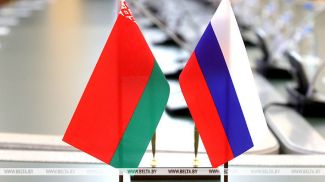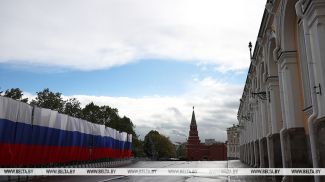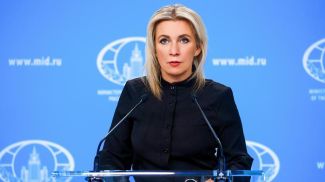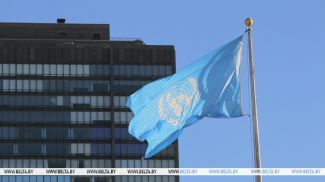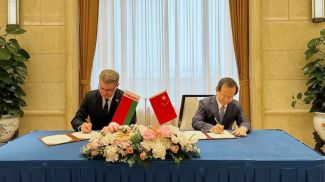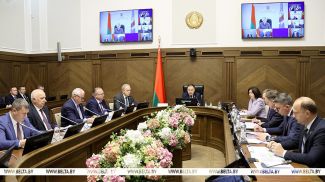MINSK, 20 May (BelTA) - Any multilateral anti-crisis initiatives must be a collaborative effort and should not affect national sovereignty, Russian Foreign Minister Sergey Lavrov said at an online High-level discussion on harnessing inter-regional integration for the SDGs which has been organized by Belarus, Barbados and the UN Conference on Trade and Development (UNCTAD), BelTA has learned.
"The world is facing many challenges. The negative impact of the coronavirus pandemic on the global political and social situation is exacerbated by political factors: growing confrontation, centrifugal tendencies in multilateral trade, abuse of protectionist measures, the use of non-legal unilateral restrictions,” Sergey Lavrov said. “Various contradictions between states are escalating, which risks the most serious consequences for the global economy. We are witnessing the fragmentation and destruction of the established cross-border chains of cooperative relations.”
He drew attention to the fact that the well-being of citizens is eroding, the prospects for global growth are being undermined, and hence the ability to effectively meet the goals on the sustainable development agenda.
According to the Russian minister, the choice of a UNCTAD platform to discuss these pressing issues seems justified. "The event is important in view of the upcoming UNCTAD ministerial conference, one of the most important tasks of which is to shape a broad unifying global agenda on trade and development for the near future," he said. “We are convinced that only a clear adherence to the multilateral trade rules agreed within the World Trade Organization, the abandonment of protectionist measures, and the widest possible consideration of collective interests will enable the international community to effectively combat global threats."
"At the same time, any multilateral anti-crisis initiatives should be a collaborative effort, should not affect national sovereignty, and should be implemented under the coordinating role of the UN," Sergey Lavrov noted. “Russia supports the 2030 Agenda which was adopted thanks to the countries' commitment to multilateral cooperation, the principles of equality, shared responsibility and solidarity."
Last year, Russia presented a voluntary national review of the SDGs, which contains information on the main achievements in the economic, social and environmental sectors for the first five years since the global goals were agreed upon. “Russia also contributes to the implementation of the 2030 Agenda through financial and technical assistance to interested countries, with the annual assistance exceeding $1 billion. Priority recipients of Russian assistance are the CIS countries. Given the growing number of regional and integration associations and their increasing clout in world politics, it is important to establish a mechanism of coordination and exchange of experience,” the Russian minister of foreign affairs said.
Integration associations are a powerful resource for achieving the SDGs in order to overcome the negative consequences of the pandemic and to promote the rapid post-COVID recovery of the global economy. “Establishing an interregional dialogue seems to be a constructive step that prevents bloc confrontation and makes it possible to effectively combat distortions in part of the abuse of unilateral restrictive measures and the so-called right of the might. In this regard, we believe the initiative of our Belarusian and Barbados partners to launch a dialogue mechanism between the integration associations involving UNCTAD in this process to be timely. This fully corresponds to the mandate of the conference, which authoritative expertize potential seems to be in high demand amid the tasks to enhance the role of regional economic ties in the global context of implementing the Sustainable Development Goals,” Sergey Lavrov said.
“A significant driving force in ensuring sustainable and inclusive economic growth for our country is regional integration, primarily within the framework of the Eurasian Economic Union. One of its main goals is to create conditions for the stable development of the member states' economies in order to improve the living standards of their people. We are witnessing an accelerating process in the achievement of the SDGs by the countries of the Eurasian Economic Union in the areas that fall within the competence of the EAEU's supranational bodies. The common market of goods, services, capital and labor gives the countries the undeniable competitive advantages on the way to towards such Sustainable Development Goals as the complete eradication of poverty, ensuring food security, sustainable economic growth, and inclusive industrialization,” the minister said.
The EAEU has completed the initial stage of development and became an effective international organization of regional and economic integration and has started developing its potential as a key instrument for ensuring sustainable economic development, establishing cooperative ties, strengthening the competitiveness of its member states and promoting their economic interests in the international arena.



